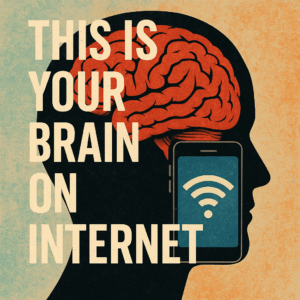This Is Your Brain on Internet
There was a time when boredom had texture. You stared out the window. You waited in line. I remember, as a kid, lying in our one-acre field of tall mustard grass, staring up at the white billowy clouds as they slowly rolled by, thinking about nothing in particular. It was an era wour brain, left to its own devices, wandered, stitched thoughts together, and sometimes—miraculously—came up with ideas. That time is gone.
Now, we flick. We swipe. We scroll. Boredom has been colonized. Every spare second is filled with noise disguised as information, entertainment repackaged as knowledge. The internet, that shimmering lattice of instant gratification and infinite access, has become our primary interface with the world. And it’s rewiring us in ways we still pretend not to notice.
Let’s be honest. The internet isn’t just changing how we think. It’s diminishing our capacity to think at all.
The Cult of Partial Attention
We’re all multitasking. All the time. Except we’re not. I often tell audiences that multitasking is a lie. The brain doesn’t multitask; it toggles. Badly. Studies confirm what we already feel in our bones: when you’re checking email, glancing at chat messages, watching an Instagram short, and half-listening to a podcast, you’re not doing any of those things well. You’re skimming reality.
 This isn’t a byproduct of bad habits—it’s by design. The internet was built to fragment your focus. It profits off your distraction. That little itch to check your phone during dinner? That’s the business model.
This isn’t a byproduct of bad habits—it’s by design. The internet was built to fragment your focus. It profits off your distraction. That little itch to check your phone during dinner? That’s the business model.
Concordia’s Younes Medkour calls this the rise of “continuous partial attention.” We are aware of many things, engaged with none. The result? Chronic cognitive fatigue. It’s not just that we can’t focus, it’s that we’ve forgotten what focus feels like.
Memory? Just Google It
There was a time when knowledge was internal. You carried facts around. You knew things. Today, memory is externalized. Why remember anything when you can Google it?
This is the “Google Effect”—a term from studies showing how the brain is adapting not to remember information, but where to find it. Our brains are outsourcing cognition. The more we use the internet, the more it uses us.
Of course, defenders argue that this frees up mental space. But the cost is depth. We’ve traded comprehension for convenience. We skim instead of read. We glance instead of grasp. And when we finally want to engage, we find we’ve lost the muscles for it.
Critical Thinking Is Collateral Damage
And then there’s the algorithm. Social media doesn’t show you what’s true. It shows you what will keep you scrolling. It feeds you what you already agree with, sealing you inside a digital echo chamber.
This isn’t just annoying. It’s epistemically corrosive. When every feed confirms your bias and every search autocompletes your worldview, critical thinking dies of neglect.
I came across an interesting blog post on The Unbroken Self article that put it bluntly: “The internet rewards certainty, not inquiry.” That’s not a flaw. That’s the core mechanic. Platforms like Facebook and YouTube don’t want you to think—they want you to engage. And outrage is more engaging than nuance.
What McLuhan Knew
Back in the ’60s, Marshall McLuhan warned us: the medium is the message. It’s not just what you watch, it’s how the medium reshapes you. Slate recently connected McLuhan’s media theory to modern AI, pointing out that tech thinkers like Peter Thiel aren’t just building tools—they’re building cognitive environments.
And that environment is flattening us. AI writes our emails. Spotify curates our taste. Google finishes our sentences. The more helpful the internet becomes, the less we have to do. We’re not just distracted. We’re deskilled.
The Price of Convenience
Let’s be clear: the internet isn’t evil. It’s miraculous. It’s connective tissue for a global brain. But we’re using it like junk food. All day. Every day. No filter. No brakes.
The sixth source you shared laid out the risks plainly: attention erosion, shallow learning, filter bubbles, neurobiological shifts, and even potential addiction. And yet we keep going, wired into our screens like it’s oxygen.
Why? Because it’s easy. Because the alternative—intentional, mindful engagement with a messy, analog world—is hard.
Is There a Way Back?
Maybe there is no going back. Maybe we don’t want to. But if we’re honest, we can feel it: a kind of low-grade grief for a mind we used to have. A way of thinking that was deeper, slower, more human.
We can’t uninvent the internet. But we can stop pretending it’s neutral. It’s not. It shapes us. And right now, it’s shaping us into fragmented, reactionary, tired versions of ourselves.
If we want to reclaim our minds, we’ll need to unplug—often and deliberately. Read real books. Let silence back in. Get bored again. Let the mind wander, stumble, and surprise itself. That’s where thinking lives. And we’ve been away too long.
Personally, I’ve started pulling back. I try to drive without GPS—just memory, signs, and the occasional wrong turn. I’m listening to CDs in the car again, spinning vinyl on a thirty-year-old stereo, hearing albums start to finish the way the artist intended—not shuffled into background noise. At the end of the workday, I leave my phone on the desk and walk away. I talk to people without a screen between us. I go outside without tech. It’s not a manifesto—it’s just a quiet rebellion. A way to remember what it feels like to be fully present in the world.




